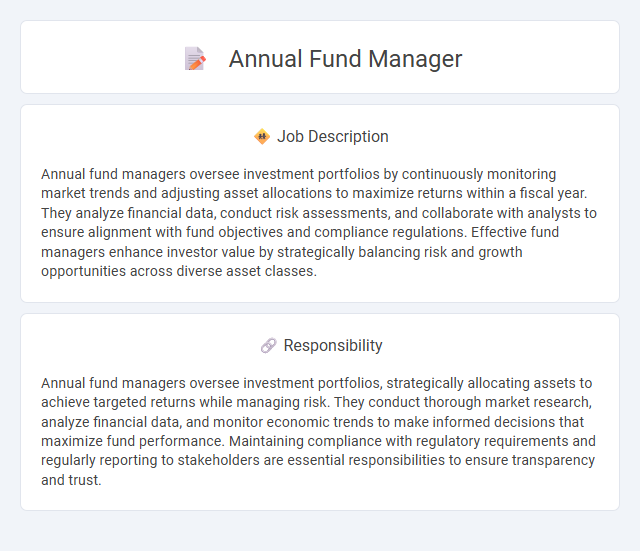
Annual fund managers oversee investment portfolios by continuously monitoring market trends and adjusting asset allocations to maximize returns within a fiscal year. They analyze financial data, conduct risk assessments, and collaborate with analysts to ensure alignment with fund objectives and compliance regulations. Effective fund managers enhance investor value by strategically balancing risk and growth opportunities across diverse asset classes.
Individuals with strong analytical skills and a high tolerance for stress are likely suitable for the role of an annual fund manager. People who thrive in fast-paced environments and possess a keen attention to detail may find this job aligns well with their strengths. However, those who prefer routine tasks and low-pressure situations might struggle to succeed in this demanding position.
Qualification
An annual fund manager typically requires a bachelor's degree in finance, economics, or business administration, with advanced certifications like CFA (Chartered Financial Analyst) preferred for higher-level positions. Strong analytical skills, proficiency in financial modeling, and experience with portfolio management software are essential qualifications. Candidates must demonstrate expertise in market analysis, risk assessment, and strategic investment planning to effectively manage fund performance over time.
Responsibility
Annual fund managers oversee investment portfolios, strategically allocating assets to achieve targeted returns while managing risk. They conduct thorough market research, analyze financial data, and monitor economic trends to make informed decisions that maximize fund performance. Maintaining compliance with regulatory requirements and regularly reporting to stakeholders are essential responsibilities to ensure transparency and trust.
Benefit
An annual fund manager likely offers investors the benefit of disciplined portfolio management focused on yearly performance goals. Their expertise may increase the probability of achieving consistent returns by adjusting strategies based on market conditions. Investors might also gain from professional risk assessment and diversified asset allocation tailored to annual objectives.
Challenge
Managing an annual fund likely involves navigating the challenge of balancing risk and return amid fluctuating market conditions. Fund managers probably face pressure to outperform benchmarks while ensuring portfolio diversification and liquidity. The constant need to adapt strategies based on economic indicators and investor expectations could present ongoing obstacles.
Career Advancement
Annual fund managers play a critical role in overseeing investment portfolios to achieve consistent returns, positioning themselves for career advancement through demonstrated expertise in asset allocation and risk management. Mastery of financial analysis and performance evaluation enables fund managers to progress to senior leadership roles such as portfolio directors or chief investment officers. Strong track records in fund growth and client relationship management are key factors that accelerate promotion within top investment firms.
 kuljobs.com
kuljobs.com